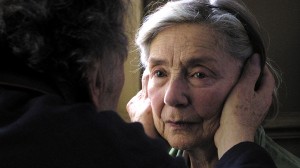Amour
Starring: Emmanuelle Riva, Jean-Louis Trintignant
Directed By: Michael Haneke
Reviewed by Danielle Muir
[rating: 4/5]
Those familiar with director Haneke’s style know that Amour is probably one for the fans only. His lengthy scenes, static shots and desire to capture authenticity would be excruciatingly painful to anyone with a short attention span, or who have become accustomed to the rapid-fire pacing of popular films. But for those who know his works, this is one of Haneke’s finest – Amour is truly elegant filmmaking.
Amour begins by showing you the conclusion – softening the emotional turmoil felt as the movie unfolds and its characters deteriorate from the citizens with poise and grace we’re introduced to. At least we can remember throughout, as the tears begin to dribble, that they are at peace. The tragedy stems from the elderly couple, Georges and Anne, and the way it’s obvious that they have become one entity – reading together, having breakfast, engaging in conversation and going to the theatre. You rarely see one without the other in a single frame. However, when Anne suffers a stroke and slowly begins her devastating decline, Georges is left to care for his wife. Amour focuses on Georges finding new strengths and ways of coping as Anne loses her ability to function, and also everything that made her his life partner.
There is really no more to it than that. How this movie tears at your soul is watching the dignified Anne continuously try to grasp onto her independence and tact whilst the disease pulls it out of her reach. This could only have been possible with the powerful performance of Emmanuelle Riva, whom in my opinion should sweep the Academy Award. When in one scene she utters to Georges “I don’t want to go on”, it’s not a selfish desire. You understand exactly how she’s feeling at that moment – and once you see the effects of the continuous decline you start to wish the film could have ended her suffering at that point. Jean-Louis Trintignant carries the film with momentous gravitas, as he has to not only endure the degeneration of his wife, but also supporting characters telling him how best to take care of the situation (children, rogue nurses). Resilient and suffering without disease, his love for Anne subsists on the memories they shared and the moments that unified them.
The only points I will raise with a neutral rather than positive slant is that some of the obviously metaphorical scenes I didn’t understand, and will require more thought. There are a few extensive sequences with a pigeon who flies through an open window, and also a few empty shots of the house towards the third quarter which I don’t recognise the significance of, however these don’t detract from the emotional impact, rather they leave you with something to ponder.
Amour is a beautiful, albeit tragic film by Michael Haneke that deserves to win any accolades for which it is nominated. This sensitive portrayal of the strength of a bond between partners and how cruel the human body can be to itself towards is conclusion is terrifying in its realism – but completely necessary.




